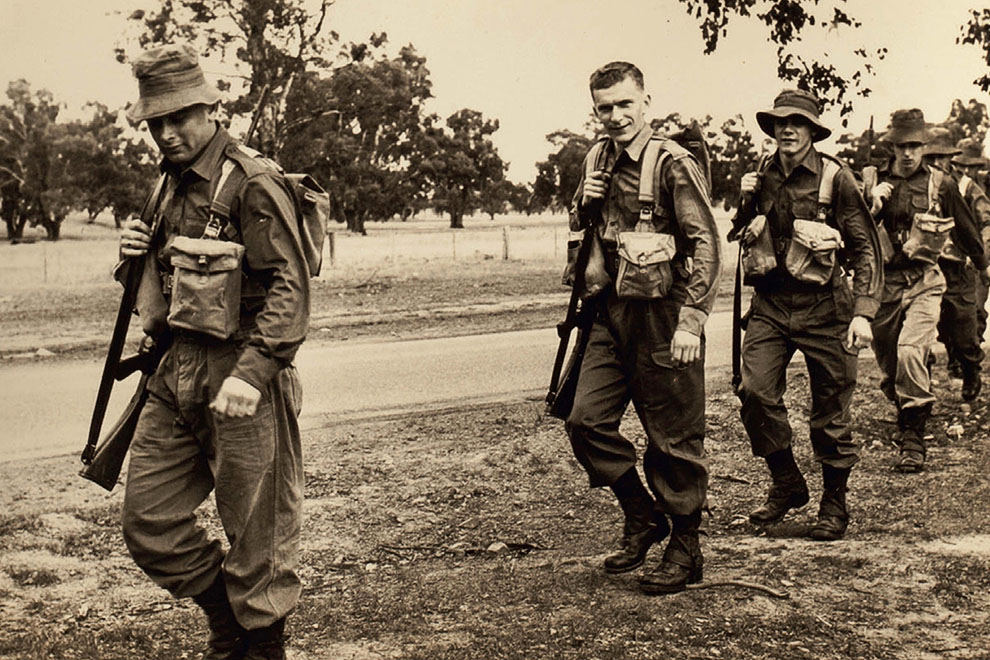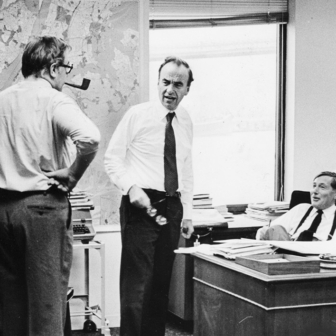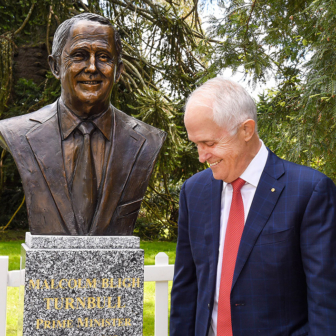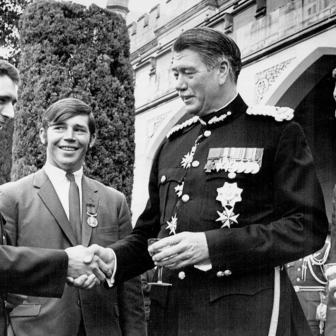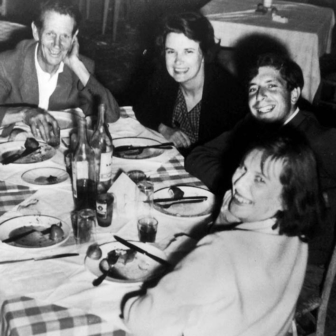When This Thing Happened: The Story of a Father, a Son, and the Wars that Changed Them
By Michael McKernan | Scribe | $29.99
In April 2015, on the fiftieth anniversary of prime minister Robert Menzies’s decision to commit Australian combat forces to South Vietnam, political commentator and columnist Gerard Henderson wrote that it was a “correct decision taken in the interests of Australia.” He argued that the 521 Australian soldiers who died there “did not die in vain” because that ten-year war gave Southeast Asia, Australia and New Zealand time to equip themselves to handle the communist victory in Vietnam in 1975 much more effectively than would have been possible in 1965.
This is a big call, particularly given the fact that, of the 521 Australians who died, 185 were conscripts; surely this must be of some moral relevance to any judgement about the outcome. And it is impossible to judge the “correctness” of the Vietnam war without considering those who came back injured and damaged, unable to lead a functioning life again. It is this – the impact of war – that shapes the narrative of When This Thing Happened, a wonderful new book by Australian historian Michael McKernan.
The story is straightforward. In 1949 Michael and Anna Stawyskyj, a young married couple from Ukraine, arrived in Australia as refugees, two of the 75,486 displaced persons settled that year as part of the postwar nation-building scheme of the Chifley government. Having both spent years working as slave-labourers in the madness of Hitler’s Europe, they had met and married in a displacement camp in Germany after the war. Their first child, Jaroslaw (Joe), was born in the camp. Returning to Soviet-controlled Ukraine was too risky – for them and for the families they had left behind – so they sought resettlement and were given permission to go to Australia. They never saw their parents or (bar one) their siblings again.
In Sydney’s outer west they found factory work, bought a block of land, built a modest home, gave birth to two more children, and spent the next two decades establishing stable and secure lives, content with their luck in Menzies’s Australia. But in 1969 their luck ran out, and the Stawyskyjs faced tragedy all over again. Their first-born, Joe – who had become an Australian citizen in 1965 – had been conscripted two years earlier and sent to Vietnam, one of the first batch sent under Menzies’s National Service scheme. He was almost fatally injured, and remained in hospital, initially in a coma and then in rehabilitation, for the next three years. He lived another forty years, but he needed constant care, never walking or regaining his short-term memory. Anna died suddenly of heart failure in 1987 at the age of sixty, worn out, McKernan suggests, by her dedication to the care of her injured son.
The two wars – the second world war and the Vietnam war – provide the backdrop and context to this powerful and engaging story. But the book is no military history. McKernan wants to describe the cost of war for one Australian family whose members had no connection to Australia when they arrived two decades before their son went off to fight in its name and become one of its worst casualties. This is a human story, described simply as “the story of a father, a son, and the wars that changed them.” It is also a personal story; the family in question are Michael McKernan’s in-laws. Joe is McKernan’s wife’s brother, and Michael Stawyskyj (born Mychajlo) is his father-in-law. This is their story, told sparingly and without excessive sentiment.
McKernan is well-positioned to write this book: he is a successful author of more than twenty books about Australia’s social and military history, in many of which he charts the effects of war on Australian society. This latest book engages across a number of levels: historical, cultural, sociological, political and psychological. But it is not polemical, and we are never lectured. Being a family member also means that McKernan can place himself inside the narrative, which he does to great effect. Over many years, Michael Stawyskyj recounted his life to his son-in-law as they enjoyed a beer on his back porch. His daughter (McKernan’s wife, Michalina) brings the scene to life: it was “just a Fairfield fibro,” she says, “three bedrooms with a large back room added for Joe and a nice porch out the back.” McKernan describes their talks about Michael’s experiences in Europe: “Michael was matter-of-fact about all this in his storytelling, downplaying his own bravery and generosity… He never spoke of homesickness, of loneliness, of terror.”
McKernan, keen to let the story speak for itself, resists portraying the family as victims, largely, he says, because they refused to see themselves that way. In Michael’s life, as McKernan tells us, “things happen… the responsibility was to accept what had happened, and to work with what was provided.” The title makes it clear: Michael would frequently refer to Joe’s terrible accident as “when this thing happened.” So we learn of the resilience and strength of this otherwise ordinary couple, their love for each other and for their children, their uncomplaining approach to the daily struggles of being “reffos” in a new and strange land, and then the unrelenting demands of looking after Joe. To the suggestion that they should place Joe in care, Michael told McKernan that he and Anna reacted with disbelief: “We were his parents,” he explained simply, “he was our son.” The events surrounding Joe’s participation in Anzac Day marches (for thirty-four years he was pushed in a wheelchair by Vietnam veteran and fellow conscript, Siggy Jablonski) are represented as a celebration of the best of the human spirit.
While McKernan doesn’t lecture, some judgements are nevertheless implied. He refers to the insights of former army officers who believe that military and political leaders “simply had no understanding of the war they had agreed to fight.” He draws on a 1987 speech given by Peter Gration – former chief of the Army and then chief of the Defence Force – who said that “the truth is that we knew very little about the province when we went in – of its long history of struggle against the French… of the almost complete control of the province by the VC [Viet Cong].” On another occasion McKernan refers to the “madness” of an Australian initiative to lay mines to provide a barrier against the enemy; the mines were instead collected at night by the enemy and used to devastating effect. It was probably one of these mines that blew up the truck in which Joe was travelling, catapulting him into the air and inflicting his terrible head wounds.
The book is divided into two sections: part one deals with Michael Stawyskyj’s story, and the effects of the second world war on his and Anna’s lives; the second section, subtitled Joe’s Story, deals with Joe’s life as a young immigrant child, his passage to young adulthood in 1960s Australia, conscription and the very short time (less than one month) he spent in Vietnam before he was injured, and his subsequent life in his parents’ care. It is not a book, then, that focuses only on the Vietnam war.
But for this reader – whether this was McKernan’s aim or not – the politics of Australia’s role in Indochina is never far from the surface. Joe had been chosen in 1967 in a government-run ballot to spend the next two years of his life in the Australian army, underlining, as McKernan points out, that life itself can be a lottery. McKernan cites other examples from Michael’s and Anna’s lives at the end of the European war to show how random choice can profoundly influence our lives. In Joe’s case, though, it was not only the roll of the dice that destroyed his life; it was also two political decisions made by Australian governments: one to introduce conscription, and the other to send conscripts to Vietnam. As McKernan says, a “ballot seems such a cruel way to determine the fate of twenty-year-old boys.”
There is enormous sadness and poignancy in this book. I read it in one day and felt so moved and engaged – and yes, angry – by what I read that I turned back to page one and started all over again. I don’t usually cry while I’m reading a book – but I did in this one, on both my first and second readings. In 1992 McKernan took his father-in-law to a service to inaugurate the Australian Vietnam Forces National Memorial on Anzac Parade in Canberra. Looking down Anzac Parade where the ceremony was due to be held, the normally taciturn Michael turned to his son-in-law and said, “He should have died, Joe, he should have died.” McKernan describes this as “the saddest thing anyone has ever said to me.” It’s also one of the saddest things many of us will ever read.
I hope this book reaches many students of Australian twentieth-century politics, society and history, and is read by those who write about them. •
